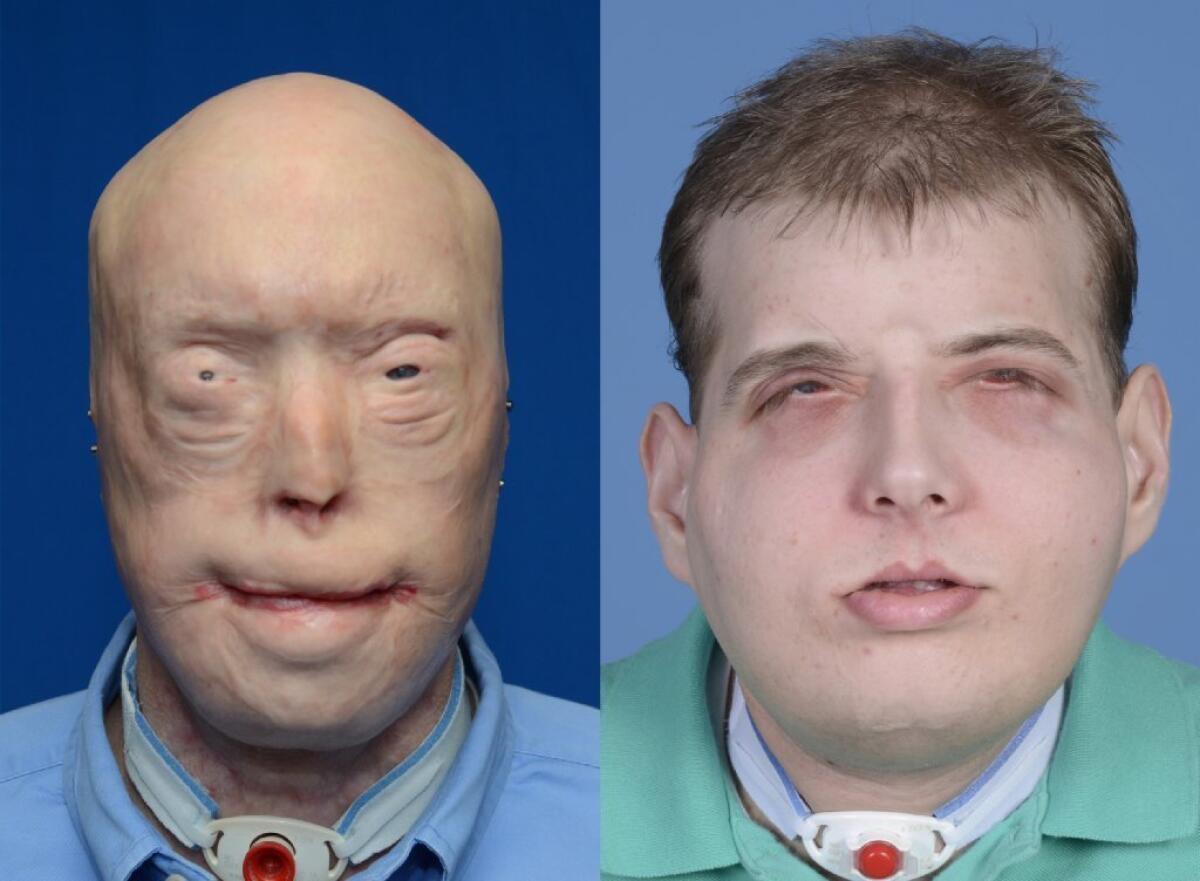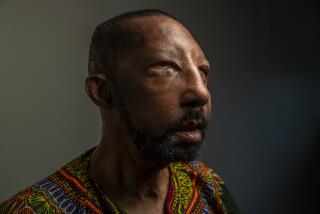Most extensive face transplant ever performed is a success in New York

Facial transplant patient Patrick Hardison, a Mississippi firefighter, is seen here before and several weeks following his surgery. Now 93 days after his surgery, the patient has shown no signs of rejecting the facial tissue donated by a 26-year-old bike messenger who was declared brain-dead after an accident.
- Share via
A team of medical professionals in New York City has successfully performed the most ambitious facial transplant ever attempted, involving the transfer of eyelids, scalp, ears and subcutaneous bony structures, to restore normal facial figures to a volunteer firefighter whose entire head was grievously burned while responding to a Mississippi house fire.
On Aug. 15, 2015, Patrick Hardison underwent a 26-hour procedure at New York University’s Langone Medical Center in New York, where surgeons grafted the full scalp, face and neck of 26-year-old bicycle messenger David Rodebaugh, who was declared brain-dead following an accident.
Eduardo Rodriguez, the NYU Langone plastic surgeon who led the team performing the procedure, called the successful transplantation “historic” and reported that, 93 days after the surgery was performed, Hardison has shown no sign of rejecting the donated tissue. While he will likely remain on anti-rejection drugs for his entire life, Hardison has already been able to reduce his medications, said Rodriguez.
Hardison, a husband and father of four, had lived with a severely disfigured face and head since Sept. 5, 2001, when he entered a burning house in search of a missing woman. After the home’s burning roof collapsed on him, he felt his protective mask melting on his face.
In a video shown Monday, Hardison’s wife and children are seen greeting him for the first time following his surgery. His two younger children had never known any other father than the man who, when leaving his home, disguised his injuries with prosthetic ears, sunglasses and a baseball cap.
Hardison recently shopped for clothes at a department store in New York and ate a gyro sandwich outside of his hospital room with a friend. Rodriguez reported his patient was happy not to have been stared at on those occasions.
Despite the “mental scarring” that haunts any patient who has lived with disfigurement, said Rodriguez, “he’s doing very well today.”
Helen Irving, president and chief executive officer of Live On New York, an organization that facilitates the procurement and transfer of tissue for transplantation, on Monday also praised the family of tissue donor David Rodebaugh.
Rodebaugh was described as a “free spirit,” a designer of skate park platforms, and “one hell of a BMX bicyclist.” Tall and athletic, he was, said Irving, “a humble, gentle giant” who had always wanted to be a firefighter.
When Rodebaugh’s mother saw Hardison with her son’s transplanted facial tissue, Irving said she fell “silent, gasped, drew a breath, and asked if she could call back.” When she did, Irving reported, she said “you were right. Patrick is beautiful.”
“David was born a miracle,” Rodebaugh’s mother said. Now, she aded, “the miracle of David will live on.”
Rodriguez said that within six months, Hardison’s speech will improve dramatically. In January or February, the patient will return to the operating room, where physicians will tailor and trim excess tissue around his eyes and mouth to improve their movement and physical appearance, Rodriguez said.
Only once before has such an extensive transplant of facial tissue been tried, said Rodriguez. That attempt took place in Paris over a decade ago, and the patient died of complications, Rodriguez said.
“This is not an operation that’s for everyone. It’s for courageous inidviduals,” said Rodriguez. The success of the much-rehearsed procedure demonstrated that delicate structures such as eyelids can be successfully transferred and that such extensive tissue--including underlying nerves and blood vessels--can be grafted to a recipient without the loss of tissue to lack of circulation.
“This is here to stay, it will not go away,” said Rodriguez, who added, “we can do this safer” in future cases. Future patients for such surgery may include service personnel who have been disfigured in combat situations, he said. The program that allowed the transplantation to take place was funded by the Defense Department.
Follow me on Twitter @LATMelissaHealy and “like” Los Angeles Times Science & Health on Facebook.
MORE FROM SCIENCE
Why we need a new definition of the word ‘planet’
Obesity is still a growing problem for American adults, CDC says
Adult cigarette smoking reaches new low -- but stays stubbornly high among some groups







